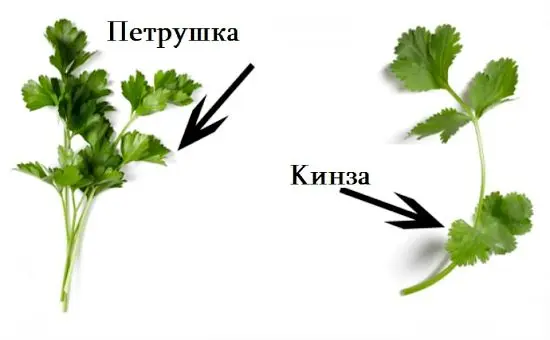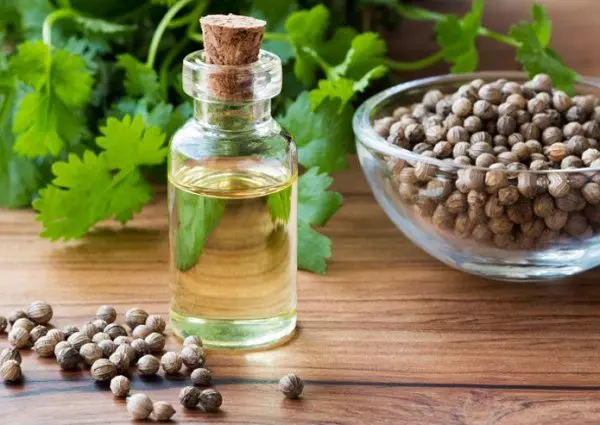Contents
😉 Hello everyone! Thank you for choosing the article “Coriander: Health Benefits, Medicinal Properties” on this site.
What is cilantro
Coriander is a spice and medicinal plant in the Umbrella family. This family includes: parsley, dill, fennel, carrots, celery, parsnips, etc. Coriander has a second name – cilantro, so called coriander greens. The word “cilantro” is more commonly used in colloquial speech. It is both a spice and a herb at the same time.
The name of the plant comes from the word “bug”. The fact is that immature seeds have an unpleasant specific smell of a bug. And ripe seeds, on the contrary, have a pleasant piquant aroma.

Outwardly, cilantro is similar to its relative – parsley, but its leaves are more tender. The fruits (seeds) and greens of the plant are used in medicine, cooking and cosmetology.
The native land of the plant is North Africa and Western Asia, and its age is several thousand years. Coriander seeds were found in ancient tombs of the pharaohs. It was used in ancient Rome and Greece, adding to wine and food, used as a medicinal plant. The German physician and botanist Jerome Bock mentions coriander in his writings (1540).
This herb is often found in herbal gastric preparations. Housewives cannot do without this spice when canning cucumbers, zucchini and tomatoes. It is advisable to store coriander seeds in a glass container with a tight lid in a cool dark place. Shelf life is no more than two years.
This spice is rich in vitamins, it contains B vitamins, vitamins A, C, P. The seeds contain sugar, starch, nitrogenous and tannins. All parts of the plant contain fats, 11 types of essential oils, alkaloids, linolenic acid. A considerable set of chemical elements.
Coriander: beneficial properties
- possesses bactericidal and anti-inflammatory properties;
- increases appetite;
- improves digestion;
- helps to fight constipation;
- improved liver function;
- stimulates the kidneys;
- lowers cholesterol and blood sugar;
- prevents blockage of blood vessels;
- help with rheumatoid diseases;
- treatment of anorexia;
- is an antispasmodic and choleretic agent;
- tissue regeneration;
- a good remedy for hemorrhoids;
- removes bad breath;
- enhances potency;
- helps in the treatment of the prostate;
- relieves swelling;
- decoction of seeds cures cough and has an expectorant effect;
- treatment of bronchitis and pneumonia;
- helps with choking, stress and tantrums;
- relieves bleeding gums,
- with neuralgia;
- treatment of eczema and erysipelas (decoction compresses);
- in cysts;
- relieves menstrual pain;
- treatment of conjunctivitis with infusion (1 tablespoon seeds per glass of boiling water. Insist for 30 minutes, strain and rinse the eyes during the day with cotton pads);
Coriander: contraindications
This unique spice should not be consumed in large quantities. The daily dose is no more than 4 grams.
- contraindicated in coronary heart disease;
- diabetes;
- thrombophlebitis and thrombosis;
- people who have had a heart attack or stroke;
- with increased blood clotting.
Coriander essential oil

The Egyptians consider coriander oil an aphrodisiac and call it “The Spice of Happiness”. It is used in aromatherapy, for massage, wraps, enrichment of cosmetic products (2 drops per 15 grams of base).
Application:
- with nervous shocks, depression, stress;
- feeling of fear;
- irritability;
- to improve memory;
- with acne;
- enhancing creativity;
- to enhance sexual activity.
Add 20 caps to the aroma lamp (for 5 square meters of the area of the room). into the aroma lamp bowl filled with hot water.
Противопоказания
- pregnancy;
- myocardial infarction;
- thrombophlebitis;
- idiosyncrasy;
- do not apply to open wounds.
Video
This video contains valuable information and recipes on the topic “Coriander: Benefits for the Human Body”.
😉 Friends, was this information helpful to you? Leave a comment. Be healthy!









